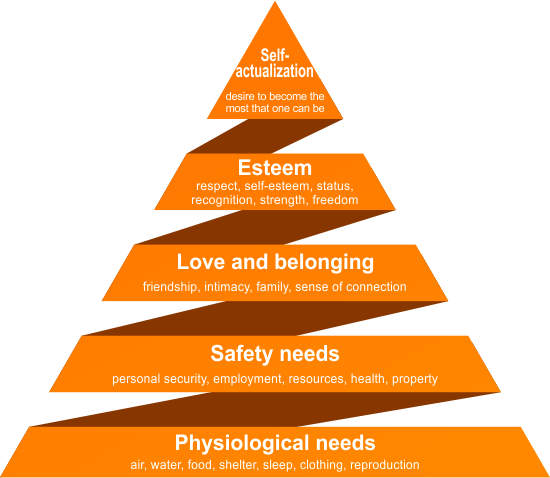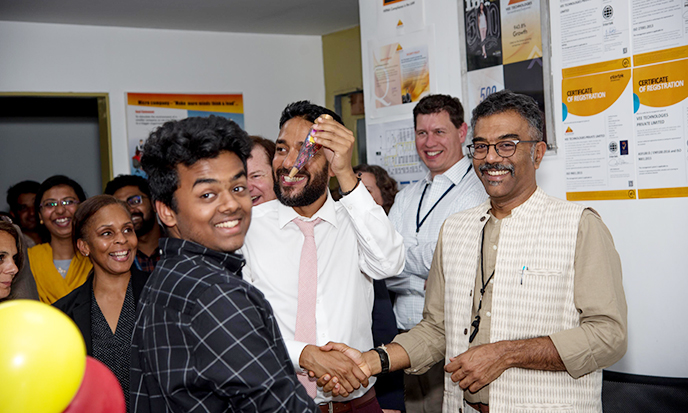Author’s Corner
Audrey Cushing, AVP Business Operations and Quality, explores the value of human relationships in the workplace in this white paper. In particular, she covers using motivation as a tool in creating successful outsourcing relationships.
Please click on the video to the right to learn more about Audrey, her motivation for writing this white paper, and the impact of successful outsourcing relationships.
To discuss this white paper in detail, please contact Audrey using her information provided at the bottom of the page.
Introduction
If 2020 has taught us anything, it is the value of human relationships, particularly in the workplace. Strong bonds with coworkers and workplace leaders are as crucial to our daily existence as food and water. By nature, we are social creatures, wired to connect with others. Our emotional needs are satisfied by the other human beings with whom we interact.
A true sense of emotional connection and sense of belonging in the workplace develops from feeling appreciated and valued for our hard work. Engaged and motivated employees are not just enthusiastic about their work, but typically outperform their coworkers.
Theories of Motivation
Motivation has been studied for years by psychologists, and numerous theories have emerged on drivers that motivate an individual’s behavior, examining how and why. One of the most recognized theories is Maslow’s Hierarchy of Needs. Maslow’s theory of motivation includes five levels of human needs: physiological needs, safety needs, love and belonging, esteem, and self-actualization.
Within each level are specific needs that, when met, allow for an individual to feel fulfilled. The hierarchy is illustrated as a pyramid that represents the need to fulfill lower-level needs before an individual can move up to the next level.
Without fulfillment on a lower-level need, a person often does not progress forward, lacking the motivation to do so. Each of the levels of needs builds on the previous one, allowing a person to feel more fulfilled.

Applying the five levels of needs to the workplace
Organizational psychologists have examined Maslow’s Hierarchy of Needs to better understand what motivates employees in the workplace. The following beliefs have been adopted based on Maslow’s theory.
1. Physiological needs translate to the most basic needs. These include a healthy work environment, including reliable income to pay for housing, food, and other essential needs.
2. Safety needs include feeling physically and emotionally safe and supported. This involves an employee’s overall satisfaction with their workplace culture. If job security is a concern for an employee, it becomes challenging to develop a sense of connection with coworkers.
3. Love and belonging needs increase the desire to work hard. When an employee does not feel a sense of belonging to their organization and coworkers, their motivation is hindered.
4. Esteem needs include feeling that hard effort is recognized and the individual is contributing to the organization’s success. When an employee receives positive feedback and encouragement, their quality and output of work excel.
5. Self-actualization needs refer to maximizing an employee’s potential. When a person reaches the top of the pyramid, there is a feeling they are doing their best work, which increases motivation to continue to grow with their organization. Employees that reach this level feel a genuine sense of belonging.
The value of employee recognition in outsourcing

Maslow is quoted as saying that business leaders “can set up work conditions so that peak experiences are more likely.” As a company, Vee Healthtek recognizes the value of recognizing employees for their hard work and dedication to our clients. At least once a month, formal reward and recognition ceremonies are held.
The notion of a positive work experience is part of Vee Healthtek’s culture. We understand and embrace what motivational theories have discovered; that it is possible to engage and inspire the workforce. Jobs are made better and more satisfying through recognition and praise. These principles, along with an ongoing investment by the company to achieve these values, creates a collective feeling of belonging to a work “community” that cares about its employees Our CEO, Chocko Valliappa, pictured above presenting an employee award, participates in these ceremonies as often as his schedule allows.
These ceremonies can also be held virtually, bringing the recognition to an even more personal level, as it allows our employees’ families to participate and share in the recognition activities.
Nurturing the outsourcing relationship
Effective outsourcing relationships are nurtured in the same fashion as successful employee/ employer relationships. In an outsourcing arrangement, an employee’s leadership team is naturally expanded to include the client as the recipient of the services. Outsourcing employees are in a unique position as they have two leadership teams to please and from which to receive recognition, their employers and their clients.
It is interesting that in an outsourcing environment, service providers’ employees rarely receive feedback directly from the client. Satisfied clients eagerly share their appreciation and satisfaction with account management leads and, although it is thrilling to hear the kind words, the latent value of the accolades goes untapped. Imagine, instead, a scenario where the individuals performing the services for the client receive recognition for a job well done, not only from their employer but also from the client.
Fulfilling Maslow’s need for self-esteem
Organizations that outsource can also fulfill Maslow’s need for self-esteem by joining in on the recognition efforts of their outsourcing partner. This would mean that these employees, already being recognized by Vee Healthtek, would also be acknowledged by you, the client. One of our clients did just that. Understanding the importance of motivational theory and viewing Vee Healthtek as a valuable extension of their own team, the client traveled to India to meet the employees that perform their services and thanked them personally.
Returning to the United States and feeling even more connected to their Vee Healthtek’s team members, the client reached out to employees receiving awards during a given month with personalized congratulatory emails. Our Employee Connect Team reached out to the individuals that received the client notes:
“So there came my day where my hard work and effort was recognized by our client. I was really filled with joy when I read the email that the client sent appreciating all the good work that we are doing. I am really happy being part of the Vee Healthtek team as well as the client’s. I will continue to do my work which will keep making our clients happy and make sure Vee Healthtek reaches greater heights.”
“It’s my pleasure that you have recognized, appreciated and acknowledged my hard work and contribution to the team. I really appreciate your kind words and compliments. It motivates me to achieve more.”
“I’m really glad for the recognition. This was the first award for me and I’m really surprised that this was taken to the view of our client. I’m in a good vibe that I set a good example of my team and this makes me even more responsible to satisfy my client expectations.”
“Thank you very much for selecting me to receive the award. This is clearly one of the most significant events of my professional career. It was a most welcome surprise at a very important time. I was surprised and delighted to receive the appreciation from the client. I can only express my sincere thanks.”
What is really happening
Besides the importance of fulfilling an employee’s self-esteem needs, neuroscience demonstrates that the receipt of praise and recognition triggers a chemical reaction in the brain, a surge of the neurotransmitter dopamine which carries a motivational message that says, “keep working hard.” This feeling is great, a mini-high. But more importantly, recognition is a signal to the brain saying “do it again.”
The brain craves dopamine over and over. Employees who feel appreciated are proven to be more productive, positive, and innovative in their day-to-day efforts. Participating in your service provider’s recognition activities reinforces to employees that they are a great fit for their role, and are valued by you, the client.
Having our clients involved and participating in our recognition activities further connects employees to the bigger picture, the importance of their work to our clients. It encourages great work to continue and even lowers attrition. When clients reach out to their outsourced team it results in a deeper level of meaning and fulfillment for both parties.
Our client’s outreach has created a strong sense of community for our employees. They appreciate Vee Healthtek genuinely caring about them as people, and they know their extended leadership team does too. The employee’s role feels less like a job and resembles a community of people working together globally to achieve common goals.

